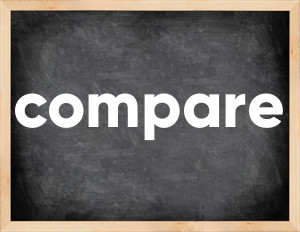 The English verb 'compare' is pronounced as [kəmˈpɛː].
The English verb 'compare' is pronounced as [kəmˈpɛː].
Related to:
regular verbs.
3 forms of verb compare: Infinitive (compare), Past Simple - (compared), Past Participle - (compared).
Here are the past tense forms of the verb compare
👉 Forms of verb compare in future and past simple and past participle.
❓ What is the past tense of compare.
Compare: Past, Present, and Participle Forms
| Base Form | Past Simple | Past Participle |
|---|---|---|
| compare [kəmˈpɛː] |
compared [kəmˈpeəd] |
compared [kəmˈpeəd] |
What are the 2nd and 3rd forms of the verb compare?
🎓 What are the past simple, future simple, present perfect, past perfect, and future perfect forms of the base form (infinitive) 'compare'?
Learn the three forms of the English verb 'compare'
- the first form (V1) is 'compare' used in present simple and future simple tenses.
- the second form (V2) is 'compared' used in past simple tense.
- the third form (V3) is 'compared' used in present perfect and past perfect tenses.
What are the past tense and past participle of compare?
The past tense and past participle of compare are: compare in past simple is compared, and past participle is compared.
What is the past tense of compare?
The past tense of the verb "compare" is "compared", and the past participle is "compared".
Verb Tenses
Past simple — compare in past simple compared
(V2).
Future simple — compare in future simple is compare (will + V1).
Present Perfect — compare in present perfect tense is
compared
(have/has + V3).
Past Perfect — compare in past perfect tense is
compared
(had + V3).
compare regular or irregular verb?
👉 Is 'compare' a regular or irregular verb? The verb 'compare' is regular verb.
Examples of Verb compare in Sentences
- After that I did not try to compare these developments. (Past Simple)
- We compared the new Mazda model with these cars. (Past Simple)
- The writer was compared to Pushkin. (Past Simple)
- John sadly compared his haircut to his friend's. (Past Simple)
- I tried to compare several bicycles before buying one. (Past Simple)
- Compared with other children of the same age, Jim is very small. (Present Simple)
- It's nothing compared to what I went through. (Past Simple)
- Why does your room seem huge compared to mine? (Present Simple)
- Her salary is nothing compared to his. (Present Simple)
- We are still pretty rich compared to others. (Present Simple)